

It’s down to specials
By Mary Anne Gill
The political futures of 10 Waipā candidates rest with special votes which are unlikely to be processed before today. (Thursday)
As The News went to
press, Liz Stolwyk and Stu Kneebone were neck and neck in the race for the second of two WaipāKing Country spots - Garry Reymer is comfortably in - on the Waikato Regional Council.
Late drive swelled voting
Awamutu.
Waipā staffers manned portable voting areas - made obvious by gigantic orange bins and billboards – and walked the streets all morning.
Reminders via the Antenno App and the big orange signs prompted a steady stream of voters and a final flurry arriving in the last half hour before voting closed at noon. Two arrived in Te Awamutu with two minutes to spare. The voter return excluding special votes was 41.25 per cent – 16,991 votes.
Some people thought they had to vote on the day. One voter believed everyone should vote but cutting it fine “was just the sort of person” she was.
Richard Tiddy had just flown in from America after four weeks away.
“We felt strongly that it was important to vote,” Tiddy said.
“Local government matters and there are some big issues that need to be addressed as well.
“I think voters have more influence in local body elections because they are not tarnished by party politics, they are more accountable and if we are interested, we can often hear directly from candidates.
“It’s a pity local government doesn’t get a greater percentage of the tax take because there are some


3
In Cambridge, Aidhean Camson, Pip Kempthorne, Dave Marinkovich, Hope Spooner, Mike Cater, Barry Quayle, Chris Minneē and Stewart Dromgool are all on tenterhooks.
About 600 special votes are to be counted.
A surge followed last week’s front-page story –Voters leave it late – and a ‘drive and drop’ initiative outside council offices on Saturday, and added 3057 votes in just three days.
That took the Cambridge ward return through to 44.47 per cent of all voters and contributed to a hometown Mike Pettit mayoral victory over incumbent Susan O’Regan and Clare St Pierre.
Pettit’s win marks an historic moment – the first Cambridge mayor in 24 years, and only the second in Waipā’s 36-year history.
Pettit’s 1222 vote margin was comfortable enough on Monday for O’Regan to ring and concede. He must now gather whatever troops he knows he has and talk about who will be his deputy and who will chair council committees.
The experienced St Pierre is odds-on, according to The News sources, for the deputy role. It makes practical sense – she lives in Pirongia and has served on council since 2013 – and some say it’s politically the


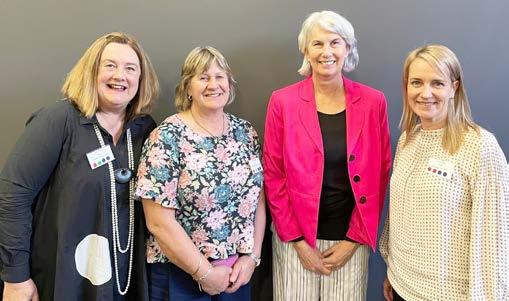
right move for Pettit.
Roger Gordon is likely to pick up chair of a revamped strategy/growth committee while Mike Montgomerie and Marcus Gower should keep finance and regulatory committees. Service delivery is understood to be under review as a committee, but it seems logical in the interim to have St Pierre continue to chair that as well.
It appears too soon to elevate Jo Davies-Colley to a committee chair - despite her three years as community board chair and being highest polling candidate in Cambridge.
If Kempthorne is bumped out of the top four, then
he will take a spot on the Cambridge Community Board. That would set the stage for a close contest between Dromgool and Minnee for the final seat on the community board.
Spare a thought for Stolwyk, formerly Waipā deputy mayor. Having accepted Saturday’s result, she deactivated her public social media, accepted an invite to attend a tourism conference in China and dropped her work clothes off at Dress for Success.
The early votes were rural ones and Stolwyk’s association with high rate increases at Waipā and a perceived association with
the pro Plan Change One brigade counted against her.
But her staunch support in urban Cambridge added substantial numbers and by Monday she was ahead of Kneebone.
“Who would know?” she told The News. “I’m ready, whatever happens.”
O’Regan was one of three women leaders ousted at the polls. Jacqui Church lost to Aksel Bech in Waikato, Adrienne Wilcock to Ash Tanner in Matamata-Piako and regional council chair Pamela Storey failed to keep her seat. Paula Southgate did not stand, so there are now no female Waikato mayors.








A Waipā District Council ‘drive and drop’ initiative had pop-up voting stations in council offices in Cambridge and Te
Leaders gone: From left Jacqui Church (Waikato district), Adrienne Wilcock, (Matamata-Piako) Paula Southgate (Hamilton city) and Waipā’s Susan O’Regan are out of Waikato local body politics.

•
Park debate
Waipā District Council’s decision to ban walkers, horses, and dogs from Sainsbury Road Forestry Park is appalling both in process and in substance.






To my knowledge, there was no public consultation or formal notification. The community became aware of the change when a photo of the new sign began circulating on social media. It was only after concerns were raised that the council issued a press release and Facebook post. That’s not engagement, that’s damage control.
The council’s reasoning, citing the Health and Safety at Work Act 2015, doesn’t hold up. The pine plantation is not an active forestry area. When logging occurs, temporary closures for safety are entirely appropriate and have been well managed in the past. But a blanket ban is excessive and out of step with other regions - Rotorua’s Redwoods, for
Heard it on the grapevine? Letters…
example, successfully balance active forestry operations with recreational use.
Sainsbury Road Forest Park has long been a valued local space for walking, riding, and enjoying nature. Removing access without consultation shows a lack of respect and trust in the community.
Health and safety matters, but so does good governance and common sense. Waipā District Council do better. Genuinely engage with the community and restore access under sensible, practical safety measures.
Tracey Hancock
Te Awamutu
Top show
Whilst we have all been of late concerned about local body elections, I would like to acknowledge the budding talent that blossomed at the recent “Alice in Wonderland” stage show at the Woolshed
On the beat with Senior Constable
In today’s hyper-connected world, social media has become the digital town square — a place where news spreads fast, opinions are shared freely, and community grapevine pages buzz with activity. While these platforms can foster connection and support, they also carry a darker side: the rapid spread of misinformation, unchecked speculation, and the real-world harm that can follow.




As a Community Constable, I’ve seen firsthand how a single post — often shared without context or verification — can ignite fear, damage reputations, and even compromise ongoing investigations. What starts as a well-meaning warning or a vague observation can quickly snowball into a narrative that’s far removed from the truth.
Local grapevine pages are often intended to be helpful — a place to share lost pet notices, traffic updates, or community events. But increasingly, they’ve become breeding grounds for speculation and armchair detective work. Posts about “suspicious activity” or “strange vehicles” can quickly turn into accusations, with names and photos shared publicly, often without any evidence.
This kind of digital vigilantism doesn’t just risk embarrassing someone — it can lead to harassment, threats, and long-term damage to a person’s reputation. Worse still, it can divert attention from real issues and overwhelm police resources with false leads.
Misinformation online doesn’t stay online. It influences how people feel, how they act, and how they treat others. A rumour about a crime that never happened can cause panic in a neighbourhood. A misidentified person can face social ostracism or worse.
And when people begin to distrust official sources in favour of anonymous posts, it undermines the very fabric of community safety.

We’ve seen cases where social media speculation has interfered with police investigations — compromising evidence, intimidating witnesses, or even tipping off suspects. In some instances, it’s led to innocent people being wrongly accused, with long-lasting consequences for their mental health and personal lives.
What Can We Do? The solution isn’t to abandon social media — it’s to use it responsibly. Here are a few simple steps we can all take:
Pause before you post: Ask yourself if the information is verified, necessary, and respectful. Don’t share speculation as fact: If you’re unsure, don’t present it as truth. Trust official sources: Police, emergency services, and verified news outlets are trained to handle sensitive information. Report, don’t broadcast: If you see something concerning, report it to the appropriate authorities — not just your followers.
Social media is a powerful tool, but with power comes responsibility. We all have a role to play in keeping our communities safe — not just physically, but digitally. By thinking critically, verifying information, and choosing empathy over outrage, we can ensure that our online spaces reflect the values we want in our real-world communities.
Let’s make sure that the grapevine doesn’t become a source of harm - but a place of genuine connection, support, and truth.
Theatre. It was a vibrant, glitzy interpretation of The Lewis Carroll story. To all involved thank you for showcasing the exceptional youthful talent in our district.
Janet Smith
Te Pahu
Game of Cones
We have noticed the delays in finishing Cambridge Road - take the last section by Te Awa in Cambridge, it has taken more than three months to finally complete, but not! During the many delays, not mentioning the inconvenience to the travelling public I notice the use of the hundreds of road cones. Where do the costs fall? I am sure that if these costs are borne by the contractor, they would have finished this section of road post haste. So, are the costs covered by way of a variation to the contract or covered by the Waipā District Council or roads board poor management? It may require our new mayor to investigate (Congrats, by the way).
Stu Barnett
Cambridge
Māori wards
Congratulations to Gwynneth Purdie for her letter concerning Maōri wards (Letters, October 9). Those of our community with part Maōri heritage are just as capable of performing as any other member of the public but they do not need to be patronised by the granting of permanent votes rather than election on merit.
Many lives were lost in World Wars I and II in the name of freedom and democracy yet we ignore the chipping away of democracy in our own back yards. It is ironic that a democratic vote is considering an undemocratic voting system.
John Martin Lawrence Leamington



Ryan Fleming
Rock winners
Te Awamutu Intermediate band Thursday’s Cancelled has picked up the top prize at the Rockshop Bandquest. More than 300 bands took part in the 24 regional events and the final was staged online with regional winners submitting video performances. The line up of Maraeroa Te Kanawa, Zita Harpur, Ronan Hinchliffe, Frances Bowmar and Ryan Tonks won a $2000 credit with NZ Rockshop.
Two on board
Former Fieldays chief Peter Nation of Tamahere and Dick Breukink of Cambridge are joining the Waikato Chamber of Commerce Board.
Flying high
Hamilton Airport operations
co-ordinator Karen Wilson was named Emerging Leader of the Year at the 2025 New Zealand Airport Awards. Hamilton Airport also won the Medium Airport Infrastructure Project of the Year for the refurbishment of its international terminal.
Power play
Waipā Networks and The Lines Company staff will be competing at the threeday Annual Connection 2025 event in Christchurch starting next Tuesday. The event, organised by training provider Connexis, involves a series of skills-based challenges for line mechanic crews and cable jointers from the country’s electricity supply companies.
Little libraries
The Waikato Literacy Association celebrated International Literacy Day earlier this month with two new Little Libraries built by the Cambridge MenzShed. Two association member schools will receive the Little Libraries which will be installed on their school grounds as a free book swap space for students.
Freedom – and mum is back
By Mary Anne Gill
Susan O’Regan’s loss to Mike Pettit in the Waipā mayoralty clearly came as a shock, but a recent comment from her son Jack helped her see a silver lining.
“He said to me a while back, ‘Mum, I know that you want to win and I want you to win for you but I want you to lose for me because I want my Mum back.’ So, I can say to him you’ve got your mum back,” Waipā’s first female and now only one-term mayor told The News on Saturday.
Just two hours earlier Waipā chief executive Steph O’Sullivan confirmed Pettit had been provisionally elected mayor. Last minute special votes were unlikely to change the outcome.
“This is not the outcome that I was seeking but I have utmost faith that the Waipā district will continue to lead the region, and we’ll see some really positive outcomes meted out as a result of the great decisions that have been made, not only by this council, but by councils before me.”
Her campaign focused on being a mayor for the whole district, while Pettit drew heavily on his Cambridge connections. He becomes the first mayor from the eastern side of Waipā for 24 years, following the late John Hewitt (1995-2001).
“I’ve always been clear that we can’t afford parochialism. We need to stop thinking short term, stop
thinking about the smaller issues and think about bigger, long-term strategic issues,” said O’Regan.
“One message from this election is that people may not fully understand the importance of that kind of thinking.”
O’Regan expressed disappointment at the loss of three strong female leaders: MatamataPiako’s Adrienne Wilcock, Waikato District’s Jacqui Church, and Waikato Regional Council chair Pamela Storey. She also lamented Waipā’s rejection of Māori wards.
“While I respect the voting public, I’m concerned that with such a low voter turnout we’re being swayed by small minority groups focused on short-term issues. That concerns me as a person who’s always wanted to think long-term.”
She declined to speculate on whether Pirongia’s Clare St Pierre split her vote.
“People vote where they find resonance - with a candidate’s story or promises. I believed people would value consistency, experience, and proven leadership over the alternative.”
At her Judge Valley farm home, the lounge was filled with family, friends and supporters. Son Ben surprised her by flying in from Queensland and husband John Hayward had the barbecue going with two joints of beef sizzling.
“When I invited everyone today, it was either going to be a reelection celebration or a freedom
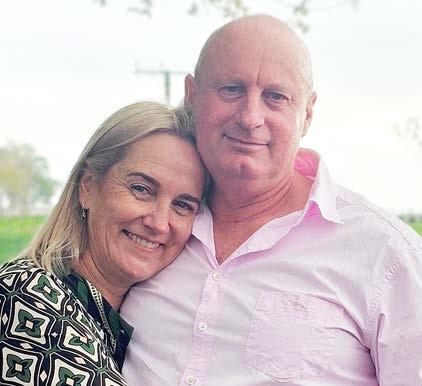
celebration,” she said.
“I’ve made no secret of the toll that this role has taken on me and my family but I’ve learned a lot. I still love this district and am completely committed to its people.”
She smiled as she recalled tidying her office earlier in the week.
“I was actually a little bit excited about the prospect of not having to come back.”
O’Regan will continue in roles not tied to the mayoralty, including as
a Crown appointee on the Waikato River Authority and a board member of Sport Waikato. First, though, she plans to take a holiday.
“I’m looking forward to being with my family - being a mum and being Jack’s mum again.
“I’ve done the best job I could in really trying circumstances. I’m proud of my legacy. I know there are changes from this term that will echo into the future, and I feel privileged to have been part of that.”
Late drive swelled vote count
really good trustworthy people involved who deserve more influence than many parliamentarians.”
Kevin Howard was travelling around in his campervan and racing to beat the clock to get back to Te Awamutu to vote. He made it with eight minutes to spare.
Among them in Cambridge was Taupō MP Louise Upston, who grinned as she confessed to dropping in her son’s voting papers which had been left on the kitchen bench at home.
Also skidding in at the last minute was Karāpiro’s Leah Gillanders, and Canadian-born Hollie O’Halloran who suggested her busy life with the kids explained her delay in voting. A similar explanation came from Jessie Wright, who brought her children along, believing that son Joey, 7, and daughter Violet, 9, could learn something about the democratic process.
Anna Humphrys moved with her husband
and two children to Cambridge last year from Ngaio in Wellington and was keen to have her say but in the busyness of life had left the papers sitting on the kitchen bench until Saturday. She brought the papers into town – minus the envelopes - which council staff provided.
Earlier in both towns other Waipā staff, including chief executive Steph O’Sullivan and executive director Katie Mayes, wandered around carrying boards urging people to vote before noon. O’Sullivan and Mayes visited the Cambridge Farmers’ Market and both sides of Victoria St drawing bemused looks from some bystanders spotted by The News.
“It was a great vibe,” O’Sullivan said. “People were really engaged and excited to be part of the process. The drive-through voting was a real hit and helped make it easy for people to have their say right up until the deadline.”
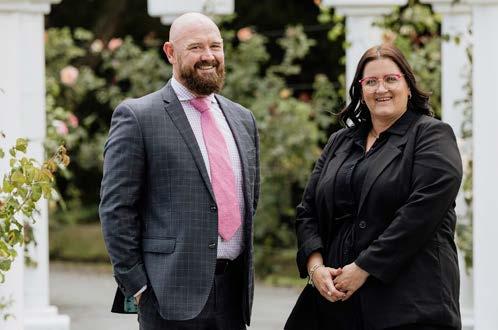

Funeral Directors
Jordan Goss & Teri Keir
Kevin Howard was travelling around in his campervan and was racing against the clock to get back to Te Awamutu to vote. He made it back just in time for a special vote with eight minutes to spare.
Photo: Jesse Wood
Back home: Former Waipā mayor Susan O’Regan with husband John Hayward after her defeat on Saturday.
Photo: Mary Anne Gill
Continued from page 1
We say… Back to the future
Three years ago, The News’ post local body election coverage highlighted the fact Waipā, Waikato and Matamata Piako districts, Hamilton city and the Waikato Regional Council all had women leaders.
This week none have those roles in local body politics.
Hamilton mayor Paula Southgate retired, district mayors Susan O’Regan (Waipā), Jacqui Church (Waikato) and Adrienne Wilcock (Matamata-Piako) were rolled –and regional chair Pamela Storey lost her Waikato constituency seat.
Those results will be in no small part a signal of electorates unhappy with rate rises – despite the best efforts of those leaders to get the balance right in a time of rising costs. It’s back to the future in the case of Matamata-Piako and Waikato - the incoming mayors finished second three years ago - while in Waipā the new mayor was pictured on the hustings with the previously ousted mayor Jim Mylchreest.
Waipā has lost a skilled politician with the defeat of O’Regan and new mayor Mike Pettit has a challenge to guide the ship in a different direction having been supportive of the previous leader before showing his hand and standing for the top job.
Three years ago, Waipā welcomed in a new mayor and deputy in Liz Stolwyk. They went their separate ways in more ways than one - Stolwyk stood for one of two Waipā-King Country seats on the regional council and was involved in a tight race with incumbent Stu Kneebone as this edition went to press. Garry Reymer topped the poll by some distance.
Without the knowledge of a breakdown of where the votes went, it is prudent to note that in Cambridge, with an electorate of just over 16,000, more than 44 per cent voted.
It was in Cambridge that the council had some of its most difficult times in the last three years with unpopular decisions on making streets more pedestrian and cycle friendly, and a proposed route to a new bridge – branded the Blue Blob – which prompted an angry public gathering.
Overall, 41.25 per cent of voters turned out in Waipā – compared with 39.65 per cent in 2022.
As with every election, talented local body politicians are rejected, and voters take a punt on both experienced and inexperienced campaigners.
Waipā, Matamata-Piako and Waikato district voters rejected Māori seats, and few should be surprised, even if there has been a softening of the no vote. As a barometer, in New Plymouth 52.6 per cent of voters rejected a Māori ward this time – compared to 83 per cent 11 years ago.
This paper has supported Māori wards, arguing that democracy works very well for the majority but muffles the voice of the minority.
Candidates for those seats which will now disappear in three years might considerer the influence Te Pati Māori’s performance in the House had on the electorate – but at the same time, it might also be asked what efforts were made to show the benefits to electorates of having a Māori voice at the table.






7pm, friday 17 Oct th
Who’s the deputy?
By Peter Carr
Sitting out last week in the greater Wellington area I watched the death throes of the election from afar – by way of my small knee-perched tablet.
So, working backwards, first the result – at least the position as it stood on Sunday – the day after voting closed.
Unless a thunderbolt descends from the Almighty, we have a new (and Cambridgebased) mayor – the first for many years. Take heart there is someone at the helm who understands the local scene here in this rapidly expanding town.
A multitude of new expanding housing areas is covering pristine land and a major review of traffic-related interest is under way. And the ‘new’ bridge is but one part of that exercise.
Turning to the elected Cambridge ward councillors the top two were no surprise and sit in safe situations. However, the next six (who can only claim two seats) will no doubt eagerly await more formal count results later this week.
In summary - with a new face crowning the mayoral chain-laden shoulders - two new councillors with no local body experience and four ‘newbies’ on the community board we are in for an interesting time. With several heavy promises personally made to obtain the votes the road ahead may become rocky. As my French master of many years ago would remind us in the Lower Third form ‘plus ca change, plus c’est la meme chose’ (Francophiles forgive me for the lack of requisite adornments to two of the letters). Translated ‘the more things change the more they stay the same’.
In other words, if the new mayor is going to pull a rabbit out of the hat and markedly
re-arrange the fiduciary aspects of the council’s performance he will need to carry a large majority of the new council with him.

His choice of deputy will be interesting and one of his recent opponents in the election carries a worthwhile experience of financial management. I have a concern that the transfer of $200 million of debt, in due course, to the new water management entity will encourage those around the large table to see this refreshed balance sheet value as a reason to launch out towards extravagant objectives.
The Maōri ward result was a surprise to me, and I regret the way it has turned out.
Putting aside the negative race-based rhetoric of some I have always thought there was merit in having someone who can bring the indigenous voice into an open and fair forum and in a quiet and professional manner that is sadly missing in our national parliament.
That said I am pleased that the Waipawide ward will still be in place until October 2028.
That Waipa – and the greater majority of districts (and regions) - failed to entice a worthwhile voting percentage speaks volumes - not the least of which is directly related to the meddling by Wellington seated politicians and government departments. Given a decent budget and a clear road ahead local body politicians can move mountains.
They are earnest, honest and generally devoid of national politics. That said the Act party have meddled this time around with mainly mixed success.


WEDNESDAYS 5:15pm - 6:00pm SUNDAYS 12:15pm - 1:00pm




























































Mike Pettit Aidhean Camson Jo Davies-Colley Roger Gordon Pip Kempthorne Shane Walsh
Taylor
Marcus Gower Dale-Maree Morgan Clare St Pierre Les Bennett Mike Montgomerie
On the Hustings – with Mary
Anne Gill
Fresh start, stalwarts gone
And that’s it, the people have spoken.
Maybe not in their droves, but we’ve had our say.
A new mayor. Stalwarts like Susan O’Regan, Lou Brown and Philip Coles gone from the Waipā District Council.
The Māori ward is consigned to history in three years’ time. A crop of fresh faces is on the Cambridge Community Board –with Andrew Myers the notable exception - and the winner of the best portrait campaign photo got in on the Te Awamutu-Kihikihi Community Board.

Website statistics since September 9, when voting began, gave Good Local Media a taster for who and what readers were interested in. Unfortunately, they did not tell us who would win.
In Te Awamutu the most popular election story was Principal in the clear when mayoral candidate and Cambridge Primary School principal Mike Pettit conceded to being naïve about plugging his campaign in the school newsletter.
Second was O’Regan does it again, a report from the Te Awamutu Business Chamber meet the candidates event.
In third place was Waipā council’s last stand, an On the Hustings piece.
Individual candidates’ responses which drew highest readership were in order: Clyde Graf, Liz Stolwyk, Garry Reymer, Stu Kneebone, Susan O’Regan, Naomi Pocock, Dean Taylor, Graham Jull, Clare St Pierre, Marcus Gower, Mike Pettit, Ange Holt and Lyn Hunt.
Several weeks ago, we asked award-winning photographer Christine Cornege to pick her top portrait shots, and she went
with Hope Spooner, Jo Davies-Colley, Peter Mayall, Charlotte FitzPatrick and Aksel Bech as her top five from the Cambridge News. Only Mayall, and potentially Spooner, missed out on election.
And in Te Awamutu she chose Liam Bullen, who was elected to the community board.
Digital marketing expert Josh Moore chose Clare St Pierre, Garry Reymer, Barry Quayle and Crystal Beavis portraits as his best. Three of the four got in. In King Country, Cornege went for Liz Stolwyk’s portrait.
Despite strong efforts by Māori ward candidatesDale-Maree Morgan and Yvonne Waho – nearly 7000 voters opted to remove the ward from 2028.
Morgan was re-elected and will serve a final term. She and husband Steve Hutt have also been elected onto the Ngāruawāhia Community Board.
Sources tell us there was quite the party going on in Gillies Street on Saturday night where Mike Pettit hosted friends, family and supporters. Our own Viv




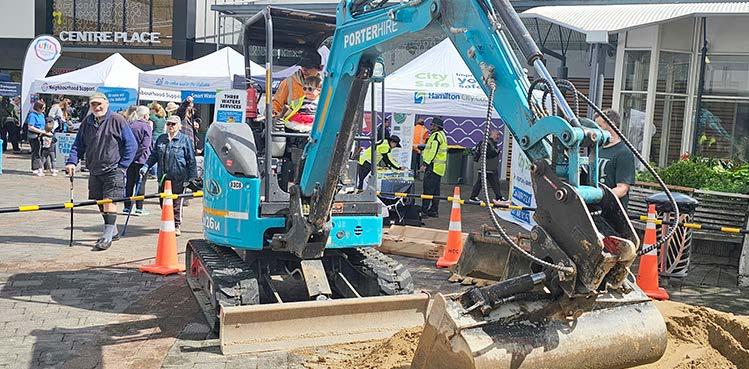
Posselt left at a respectable hour – she had copy to file for our online platforms.
Among the glitterati were Tauranga mayor Mahé Drysdale and former mayor Jim Mylchreest.
A big high five to Waipā District Council staff for their Saturday morning efforts to get people voting.
In both Te Awamutu and Cambridge, they donned sandwich boards, orange high-vis, and wheeled orange bins around to collect lastminute votes before polling closed at noon.
The News saw many
young families, including newcomers to the district, making the effort
We saw the same commitment from Hamilton City Council staff a fortnight ago in Garden Place, where they partnered with Your Neighbourhood to highlight the importance of councils in our lives. They were helped by a false fire alarm at Centre Place, which sent shoppers spilling into the council display - featuring Neighbourhood Watch, libraries, emergency planning, water, and
swimming pools. The crowd favourite? Two diggers where children could move sand from one side of a square to the other. Brilliant stuff. Good luck to all our newly-elected representatives – The News has kept copies of your promises, your social media postings and will be keeping a close eye on you all.
And to those who missed out, good on you for putting your names forward. It is never easy to stick your head out of the sand, so well done.




















Rides on diggers featured at Hamilton City Council’s recent In your Neighbourhood open day.
Photo: Mary Anne Gill
Liam Bullen – winner of the best portrait campaign photo is on the Te Awamutu-Kihikihi Community Board.
New faces at council table
By Jesse Wood
Te Awamutu-Kihikihi and PirongiaKakepuku ward voters brought in three new faces - Te Awamutu Business Chamber chief executive Shane Walsh, former newspaper editor Dean Taylor and Les Bennett – but kept two old ones, Marcus Gower who is back for a sixth term and Clare St Pierre for her fifth.
Lou Brown lost his seat after two terms.
On the Te Awamutu-Kihikihi Community Board, Liam Bullen is the new face with Ange Holt, Jill Taylor, Kane Titchener and John Wood retaining their spots.
Walsh, who was born and brought up in Te Awamutu, said he wanted to contribute to the community’s future.
“Kihikihi needs to be heard. That’s something I’ve been focussing on through this whole process. There are a few things there that we need to look at and do better,” he said.
Taylor, also born in Te Awamutu, said the fact that Walsh and he were first and second meant people wanted change.
He wants to do his best for his side of the district and make sure the whole district moves forward in a positive way – “how people want, not just what the government’s telling us and not just what staff are telling us”.
“Shane and I, and a couple of other candidates, have talked about ways to connect the community with the council, and that’s just to be involved.
“I know that past councillors have been involved, I’m not bagging them, but involved at a different level.
Taylor’s hope is to organise a consultation with members of the public.
Clare St Pierre says running for mayor was an amazing experience.
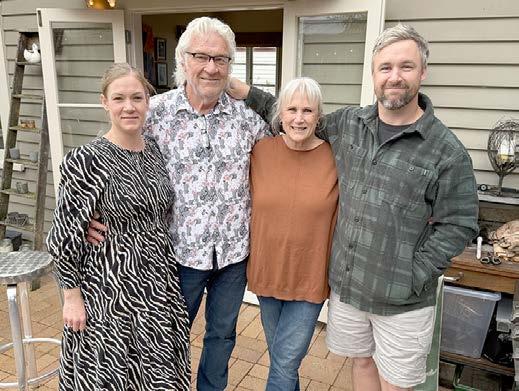
She finished behind new mayor Mike Pettit and Susan O’Regan but remains on council as top polling candidate for the PirongiaKakepuku ward.
Les Bennett takes the seat of Bruce Thomas, who did not stand.
“It’s pretty daunting and demanding, but people really appreciate anyone putting their hand up and wanting to work for the community,” St Pierre said.
“Then you realise the things that are important to people don’t always match the things that have been brought to the council table.
St Pierre says if she was offered the post of deputy mayor she would take it “but obviously it’s still early days”.
Fellow Pirongia-Kakepuku ward councillor Bennett is part of the Better Waipā team focussed on controlling expenses.
He said it was a bit of a hard campaign and “a lot of dirt got thrown around”.
“Hopefully we can make a bit of change and open up the communications with the community - that seems to be lacking - and get rid of some of the censorship that’s been going on in council,” Bennett said.
IT’S DISCOUNT TIME
ARE YOU A WAIPĀ NETWORKS CUSTOMER?
Waipā Networks customers will receive their second discount for 2025 later this month.
So far this year, we’ve returned around $2.8 million to homes and businesses across the Waipā district. If you were connected to Waipā Networks and registered with an electricity retailer as of 23 October 2025, you’ll qualify for a discount. This will appear on your next electricity bill.
As a customer-owned network by the Waipā Networks Trust, we’re proud to return value directly to our customers. It’s all part of our commitment to keeping every dollar local and supporting the region we call home.
GOT QUESTIONS?
Visit waipanetworks.co.nz or call 0800 800 769 to learn more about how customer discounts work.
By Viv Posselt
Mike Pettit took a tearful moment to gather his thoughts before announcing his win to supporters on Saturday.
Standing high on a box, his back to the open doors of the Gillies St venue he used to host his election party, Pettit wiped his eyes, fist-pumped the air and expressed his deep gratitude to “all you amazing people I have met on this journey”.
“Yeah … wow, sh.. !” he exclaimed. “It seems I have a new job!”
The call had come from Waipā chief executive Steph O’Sullivan just minutes earlier, but an overwhelmed Pettit took a few moments for himself to let the news sink in.
He spoke of being jolted into action to stand for the top slot after being asked some time ago why he hadn’t already put his hand up for the mayoralty.
Speaking to The News a few minutes after addressing his supporters, Pettit praised the other two mayoral candidates, Susan O’Regan and Clare St Pierre, for having run good campaigns.
The result will end his 31-year career as a school principal - but knows Cambridge Primary School is in good hands with wife Nic Pettit currently vice-principal.
Working with a new council team is something he is looking forward to.
“Even with a few changes it is going to be a new team, and I’m ready for that. What won’t be changing is that I can’t sit still for long … I’ll be out and about talking to people whenever I can.”

Dean Taylor celebrates being elected councillor with daughter Kirsten Eden, wife Robyn and son Ryan. Photo: Jesse Wood
men in business
DR
JAMES MCKELVIE
Your World in Focus: Achieving Outstanding Vision with Associate Professor McKelvie
Is poor vision limiting your ability to enjoy the activities you love? Imagine reading, driving, and enjoying your hobbies with crisp, clear sight without constantly reaching for glasses. In Cambridge, Associate Professor McKelvie makes this a reality for his patients. As a leading eye surgeon he brings world-class vision correction to our community, helping patients achieve outstanding sight without the need to travel.
See Clearly at All Distances, Without Glasses
Surgery goes beyond simply removing a cataract; it’s about providing a truly customised visual outcome to suit a patient’s lifestyle. From start to finish, the entire process uses state-of-the-art technology, including advanced diagnostic imaging, comfortable no-needle techniques, and premium lenses. Surgery can be customised to correct long-sightedness, short-sightedness, and astigmatism, with the convenience of restoring a full range of vision for both eyes on the same day. The goal is to deliver sharp, clear vision at all distances, allowing patients to confidently get back to the activities they love.
Expert
Solutions for
Complex Eye Conditions
His expertise as a corneal surgeon means he can offer a wider range of sight-restoring solutions. He provides advanced treatments for conditions like keratoconus, performs life-changing corneal transplants, and offers refractive surgery to correct vision. He also performs surgery to remove growths on the eye that cause redness and irritation
(pterygium surgery). This specialised skill set ensures patients achieve the best possible outcomes, even when facing the most complex or challenging eye conditions, including cases covered by ACC.

University-Level Innovation, Delivered Locally
Through his work as an Associate Professor at the University of Auckland, the care provided in Cambridge is grounded in current medical research. This ensures patients can expect evidence-based treatment that is proven to deliver results. You can be confident you are receiving modern, effective surgical care, with the convenience of being treated right here in Cambridge.
Invest in a Lifetime of Outstanding Vision There is no need to wait to see the world more clearly. Associate Professor McKelvie prioritises timely care, with consultations available for most patients within one to two weeks, and local surgery in Cambridge scheduled just as quickly. Take the first step towards a brighter future. Book a priority consultation today to explore your treatment options. Call 07 242 0877 Clinics in Cambridge and Hamilton
Day care’s job boost
By Chris Gardner
Up to 35 jobs will be created with the opening of an early learning centre on Te Awamutu’s Frontier Estate off Pirongia Road.
Old MacDonald’s Morrinsville owners Tracey Aubin and Daynah Smallwood will soon be taking enrolments for The Maples Early Learning Centre they intent to open next winter.
“We anticipate creating between 20 and 35 jobs in the local community.,” Smallwood said.
“Roles will include a centre manager, qualified and in-training teachers, relief teachers, a centre chef, and cleaner.”
The centre will offer four-day work weeks and part-time roles.
“The centre will be led by experienced, passionate leadership and a team committed to fostering a warm, inclusive environment,” Smallwood said.
“We deeply value whānau voice, and we are building a culture where our teachers are respected, supported, and empowered to thrive.”
The Maples will support up to 100 families.

The mother and daughter duo have more than a decade’s experience in early childhood education
“As mothers ourselves, we understand how important – and how emotional the decision is to leave your child in someone else’s care,” Smallwood said.
“We are committed to building a centre that is warm, beautiful, secure, and truly feels like an extension
of your home. Our passion lies in creating enriching spaces where every child and adult feels safe, seen, and supported.
The day care centre will open alongside a commercial hub that includes a café, retail space, superette, and medical precinct.
Te Awamutu Medical Centre will include up to six general practitioners and Frontier Pharmacy.
Community benefits from ramble
Tickets have gone on sale for
Awamutu Altrusa’s 30th Home and Garden Ramble.
The event has been a significant fundraiser since 1995 - by 2014 the club had distributed $300,000 into the community, and it has raised a further $231,527 in the last decade.
This year the ramble will feature a dozen venues and is a mix of garden sizes, in both new and renovated homes – and includes a chapel and a bush walk.



as major recipients of funds raised this year.
Money raised also goes to Club Literacy and other community projects, which this year includes books
for newborn babies and books for Plunket, Kainga Aroha, Loving Arms and Women’s Refuge, and a day out for Grandparents raising Grandchildren.
Robyn Atherton told The News the ramble will also feature stalls with crafts, ceramics, garden art and hand sewn little girl’s dresses and woollen coats.


“Also, this year we have a large number of vegetable plants, flower plants and bouquets of fresh flowers.”
She noted the November 2 Sunday event was well timed as the Te Awamutu Rose Society hosts its annual show on the Friday and Saturday of that weekend.
The Te Awamutu Health Shuttle, Life Education Trust and Te Awamutu Food Forests have been selected

Rosenvale, owned by Penny and Ken Diprose, is part of the Altrusa Garden Ramble.
Te
Mother and daughter team Tracey Aubin, left, and Daynah Smallwood are opening a day care centre on Frontier Estate.
DR. JAMES MCKELVIE
Bright future for college rugby
By Jesse Wood
The recent past versus present rugby clash was the culmination of a busy season for the Te Awamutu College boys’ first XV.
Played in slippery conditions, the fourth annual Bruce Bain Memorial Game was won by past 37-22.
“The past first XV snuck in a few tries early, before the college boys hit back in the sunshine with a sharp sideline try after exposing some slower legs in the past team’s flanks and wings,” organiser Ollie Ward said.
“A big thanks to our referee and to all our supporters who braved the weather – it was another great day of rugby and community spirit in memory of Bruce Bain.”
This year was the first time for a long while that the college first XV had played Waikato division one rugby.
Coached by Willem Poolman, Carl Sheridan and Chris Shields, the squad reached the semi-finals.
There they lost to a strong Matamata College team 22-0, but hopes are high for the future.
“It was physically very tough. But the boys enjoyed that level of rugby considerably more because of the challenge,” co-coach Carl Sheridan said.
“It meant that there was intensity around training, there was more intent in the training at the gym off the field too. They were really invested.
“The one thing it exposed was that we probably didn’t have the depth from a skill set point of view.”
Sheridan said heading forward they hope to have more players involved in their offseason development programme training.
“We ended up using 26-27 players for the first XV. We went into a semifinal against Matamata with a lot of broken soldiers, but the heart of our team is incredible,” Sheridan said.
“We lose 10 boys from year 13 next year but through our development programme, on paper, we have a reasonably strong looking side next year.
“We re-enter our off-season training in term 4, backing their motivation and desire to be better.
“As long as they’re motivated and keen, we need to support them.”
During the annual tournament week, the team journeyed to Pāpāmoa where

they placed third in Rugby by the Beach. It helped them connect as a team.
“We’ve already expressed an interest in going back next year. It was awesome,” Sheridan said.
“It proved to us that we probably need to do some sort of connection trip during pre-season.
“The boys got to hang out together and play games. They were fizzing and there was a lot of energy.”
Following the tournament, they got to experience cold and warm therapy at P3.
The coaching staff were over the moon to receive feedback from the accommodation and P3, about how well behaved their team were.
“That connection means catch-pass becomes easier on the field because you trust the man outside. They’re so disconnected those two things, but they’re so connected,” Sheridan said.
“If you go to war with the people you trust, you’ll play
better rugby.”
The team and coaching staff are grateful to the committee, school and long list of sponsors.
“The committee are tireless. The amount of work the 6-7 people do to represent 160170 kids across the college grades,” Sheridan said.
“Unsung heroes always. It’s a thankless job sometimes but there are some pretty thick skins amongst that team. They’ve done amazing work.”
Sheridan said whether the kids come back to rugby or not, isn’t their number one priority.
“If they come back to sport, keep themselves physically active and look after themselves, that’s important,” he said.
“In a community with one college, if you can get that one college humming, the community can be humming.
“There is a good, young, respectful workforce coming out to help support the community.”
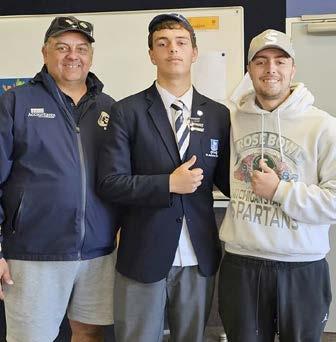
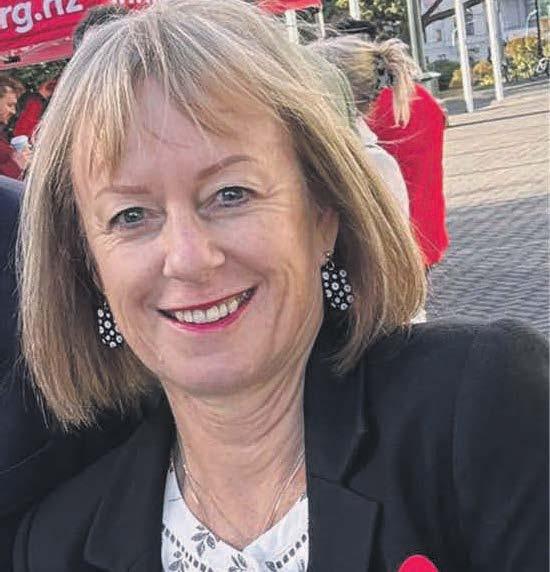
More Common-Sense from This Government
by Barabara Kuriger, MP for Taranaki-King Country
The New Zealand government’s recent changes to earthquake-prone building rules are a refreshingly practical, common-sense step in the right direction.
In the past, building owners everywhere—no matter how risky their area actually was—had to meet tough, expensive upgrade standards. This put real financial stress on property owners, especially in low-risk places, and took attention and resources away from buildings that really needed work most.
The updated rules now focus on real, proven risks to public safety. Only buildings located in medium or high earthquake zones, or those that could genuinely endanger people, will be identified as earthquake-prone. For instance, buildings with unreinforced brick walls facing busy streets will still be flagged because they’re especially hazardous during earthquakes. Conversely, large concrete buildings will undergo more targeted inspections, so owners aren’t required to pay for expensive checks unless there’s clear justification.
The definition of “priority buildings” is also smarter now, focusing on things like masonry that could fall and hurt people or block emergency response. Plus, buildings like hospitals and fire stations won’t be rushed to upgrade if it risks disrupting their essential work—they’ll have more time to make plans that work for everyone. Councils can also now give owners up to 15 years for required upgrades, making it easier and less stressful for both owners and the wider community.
Even though there aren’t many earthquake-prone buildings in our area, it has been estimated these changes could still save local businesses more than $34 million.
That’s a real boost for our region’s economy, while making sure safety efforts are directed to where they are needed most.

Backing Rural and Provincial New Zealand

Inglewood Office 80 Rata St, PO Box 124, Inglewood 06 756 6032 • Kuriger.Inglewood@parliament.govt.nz
Te Awamutu Office 196 Alexandra Street, Te Awamutu 07 870 1005 • Kuriger.Teawamutu@parliament.govt.nz

King Country Virtual Office 021 815 017 Kuriger.Kingcountry@parliament.govt.nz




Willem Poolman (left) and George Poolman flank Willem Poolman jnr after receiving his 40-game first XV cap.
Photo: Te Awamutu College Rugby
Corbin Harty (from left), Teina Beets and Brody Emery represented Waikato under-18, beating an Auckland side 27-24.
Photo: Te Awamutu College Rugby
CountryLife
Mohair and milk
By Chris Gardner
Michael Woodward never wanted to milk cows.
But that all changed after the son of Mohair New Zealand founder John Woodward met Susie, the daughter of an Upstate New York dairy farmer in Canterbury while working on Synlait’s 3000 cow farm in Dunsandel. They were two of 19 staff.
The couple married and graduated to a 50/50 sharemilker set up with 10000 of their own cows in Canterbury.
They had four children, Kylie, 15, John, 13, Jack, 11, and Charlie, eight, before moving north.
Then, while visiting family in Tirau in 2019, they started to look around at Waikato farms and found what is now Cowgora Hills on Puktetawai Road near Ōtorohanga up for sale.
“We had our eye on a place in Raglan, and this was on the way through,” Michael said.
“I grew up on undulating land, and it reminded me of home,” said Susie. They also enjoyed the feel of the
township, with its hanging baskets.
“This is a good town.”
Since 2019 Michael and Susie Woodward have owned and operated Cowgora Hills, a blended A2 milk dairy cow and angora goat farm.
A mixed herd of cows and goats graze the land, each consuming different parts of the pasture.
The pasture-based farm is a far cry from the cut and carry system operated by Susie’s parents in the US.
Back in the US, farmers are reluctant to share information about their business, so Susie welcomes the openness of the kiwi agricultural sector.
The 170-hectare farm, with 150 effective hectares, supports 300 cows supplying to Synlait and 150 angora goats supplying to local and overseas buyers. But they will soon be looking to supply to another dairy company as Synlait exits the North Island.
The move to the North Island was not without its challenges, with Susie saying the first year or so came close to breaking them.
Once they had shipped 1,000 cows
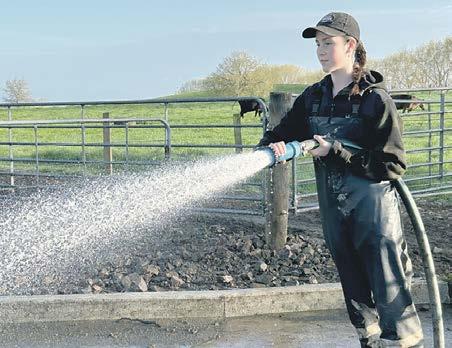

north, the country went into lockdown, making it had for the family to settle into a new community.
Then they had to get their herd accustomed to the hill country, which was quite different from the flat farms it was used too.
Things quickly changed after the pandemic, with their sons joining the Ōtewā School where Michael was coopted onto the school board four years ago.
He has also recently joined the board of Ōtorohanga College where their daughter is a pupil.
He has also just been elected onto Ōtorohanga District Council. The Woodwards employ one staff member.
They are in their second season of twice a day milking, having milked once a day since their arrival at Cowgora Hills.
“Financial pressure has forced us into that decision,” Michael said.
“We hope to go back to once a day.”
Last season the farm averaged 400 kilogrammes of milksolids per cow, or 110,000 kg of milksolids – 10,000 kilogramme more than once per day milking.
The Woodwards are advocates of the Dairy Industry Awards, having been a finalist and regional winner.
“We have got better at what we do,” said Susie.
The feedback from judges helped. Susie now serves on the awards committee and the Mohair New Zealand Producers’ Board.
About 80 per cent of the mohair production is split into 17 different grades and sold overseas where it is used in blankets and suits.
Angora fibre produced by the Woodwards goats sells for between $4 and $65 per kilogramme, depending on grade.
They supplement their fibre, which is sheared twice per year, with fibre from other producers.
“I will drive up to Northland with a trailer and pick it up,” Michael said.
“We’ll do big, 12-hour days.”
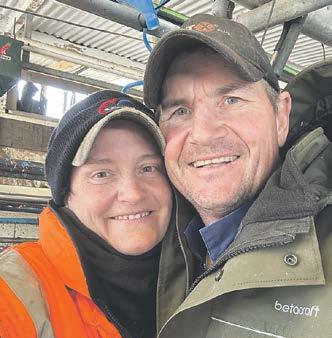
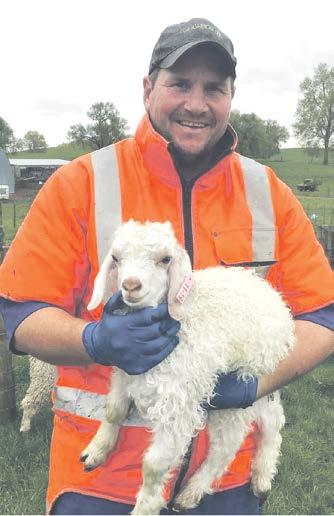
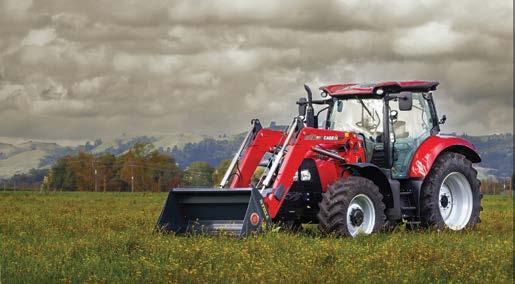

Kylie Woodward,15, helps out on her parents’ farm.
Susie and Michael Woodward.
Michael Woodward holds an Angora goat.
Rural mail cuts anger community
By Jon Rawlinson and Viv Posselt
Rural communities are reeling at the prospect of reduced postal services.
“I am very disappointed to hear they intend to cut back on the service,” said Rural Women New Zealand Waikato president Janet Williams.
“Many people feel isolated as it is, let alone without the connectivity of having mail and other items delivered to them.”
Recently approved by the government, a new deed of understanding reduces the minimum number of days per week for postal delivery.
Urban addresses need only receive mail two days per week, three at rural properties.
As Waikato has an extensive farming community, it is one of the largest areas affected, Williams said.
“People on farms, smallholdings and the like still get a lot of stuff delivered, essential farm and personal supplies,” she said.
“The man who does our rural delivery said he has no idea how he would fit his delivery requirements into three days a week as opposed to the five days he currently covers.”
The deed reduces minimums rather than maximums. However, as it also requires NZ Post to ‘operate a commercially sustainable mail service’ without government funding, the new minimums could become standard.
Williams said people living closer to main centres could more readily access everything they needed, but delivery to rural addresses was often crucial because of the distance as well as the fact that “internet connectivity in those areas is shocking,” she said.
“Not everything can be done via email.

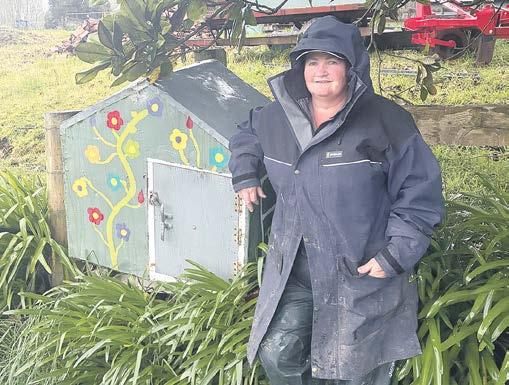
Some older people are reluctant to get their bills on their phones or computers, and I know as a JP that there are times you need to have mail with proof of name and address.”
Cutbacks would cut deep in the heart of rural King Country too, Rural Women New Zealand’s Waitanguru chair, Maree Jones, said.
“It’s frustrating as they already charge us more for rural delivery, yet they want to decrease our level of service? It also reduces options for delivery of perishable goods
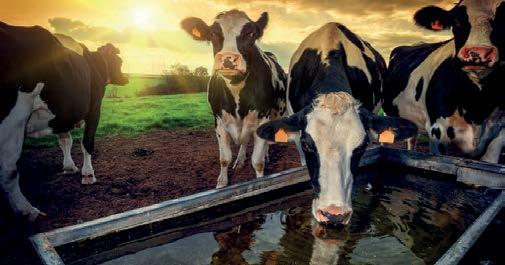
– we’re already finding that a lot of places won’t deliver perishables to our houses.”
Rural internet and cell phone reception can be sketchy at best, Jones said.
“Rural broadband isn’t exactly wonderful as it keeps cutting out and it’s just not as reliable as it is in town. Also, you can’t send parcels over the internet.”
The minimum number of postal outlets is also decreasing, from 880 to 500 and then to 400 over four years. While the number of communal collection points will be increased to offset reduced deliveries, RWNZ’s national
president, Sandra Matthews, is concerned further cuts will come.
“Rural communities are made up of hundreds of small businesses. Forcing people to travel long distances to access a post outlet or shared mail hubs creates a significant barrier. This is a particular problem for older and more isolated rural residents, and it makes doing business in rural areas even harder.”
As a State-Owned Enterprise, NZ Post is obligated to act with social responsibility, Matthews said. RWNZ is calling on the government to rethink the move.
“We want a geographic criterion in NZ Post’s Deed of Understanding to protect access in rural and remote areas, a review of NZ Post’s operating model to identify more equitable service options and for NZ Post to be upfront about the post outlets in rural areas it plans on closing.”
Struck with the Ministry for Business, Innovation and Employment (MBIE), the updated deed follows consultation with rural communities, the ministry’s James Hartley said.
“In recognition of their feedback, the government has included a greater number of minimum delivery days compared to urban areas in the deed to ensure rural communities are not disproportionately affected,” he said.
“This includes a safeguard against any rural retail store closures in the first year, unless circumstances are beyond NZ Post’s control.”
Changes are needed, he said.
“Without these changes, the cost of maintaining current services would not be financially sustainable.”





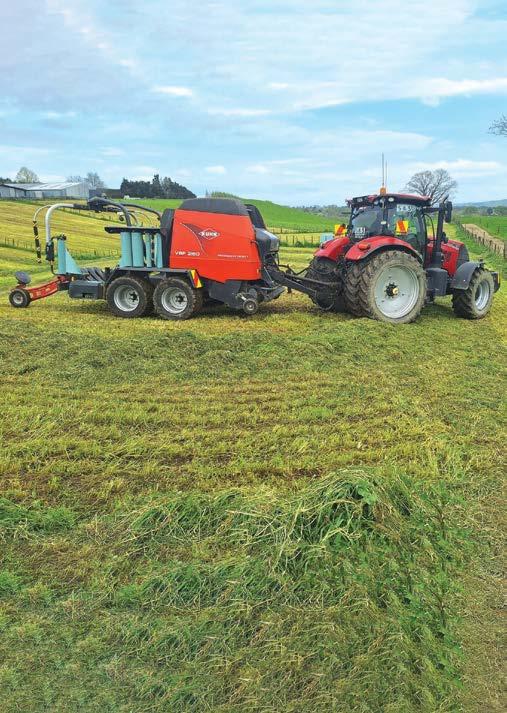


Rural Women New Zealand Waitanguru chair Maree Jones is frustrated at plans to cut rural mail services.

3 Things You Might Be Getting Wrong About Retirement Villages
Retirement villages are becoming a popular option for New Zealanders planning their retirement, but it is not the same as buying a house. Most villages provide an Occupation Right Agreement (ORA), which gives you the right to live there and use the facilities rather than legal ownership. Here are a few common misconceptions that can catch people out.
1. “Weekly fees cover all my costs” Weekly fees usually cover village services (gardening, security, communal facilities), but residents often still pay for utilities, care services, or extra support.
2. “All the money will go back to my family when I die” Your entry payment will likely not be returned straight away when you leave or pass away. In reality, it depends on the terms of the ORA and can often require the unit to be re-licensed to a new resident. Most villages will also deduct what’s often called a deferred management fee which can be up to 20–30% of the original entry price
3. “All Contracts Are the Same” Not all retirement villages play by the same rules. Fees, exit conditions, and benefits vary, and small differences can have a big impact.

Moving into a retirement village is a big decision, both legally and financially. If you are considering this step, it is important to seek advice from your lawyer, so you fully understand what it means for you and your family.
Georgia Willard

Peak production
By Jesse Wood
Dairy farmers are optimistic about the season as they reach peak production.
Following a drought, high rainfall and a record payout, October is an important month for farmers.
“If we get of an interest rate drop again in the next six months, we’re going to be in a reasonable spot, but it depends on putting production in the vat,” Pukeatua-based DairyNZ board member Chris Lewis said.
“Things are looking alright for the next six months. The record payout is very welcomed. But it makes up for a few years of being lacklustre. One year doesn’t make a lifetime of achievements. Farmers are hoping for it to be maintained for the season.
“We should get some summer rainfall, and I think farmers are going to be reasonably optimistic.
“The good thing is the beef and sheep farmers are also doing all right in our area. It’s not very often you get the triple whammy. Lamb, beef and dairy.”
Lewis said it’s not often that all three industries have “a little bit of optimism” and it should be celebrated as it’s good for everyone.
Heading into October, the rainfall hasn’t taken a break and it’s affecting many farmers across the region.
Crops will be planted late due to the weather.
“October is an important month and busy month for farmers. Busier than spring,” Lewis said.
“We’ve started mating. We’ve got crops to go in the ground and it’s our peak production month.
“We had the drought in autumn, but since May we’ve had big rainfall months. We usually get an average of 1100 millilitres year to year. We’ve already had that, with a drought.’
The last week has been just as wet as winter and Lewis said he’s hoping for a week or two of fine weather soon.
“As a farmer, you’ve got all that to contend with planning wise and mentally. It’s still challenging,” Lewis said.
“At the moment, our cows are very slow cycling because all the wet and cloudy days we’ve had.
“You want the cows to peak and if the cows don’t peak high at the moment, it’s hard to keep the momentum going for the rest of the season. It’s a critical month, October.
“If you don’t produce anything, you don’t get paid the record prices. I’m a glass half full.”
He said although it’s more expensive to do business than it was 12 months ago, “we’re still better off”.
Waikato Federated Farmers president Phil Sherwood echoes the sentiment of optimism.
“We’re forever the

optimistic. You keep going and plan for another good year. You put the drought behind you and take the season as it comes,” Sherwood said.
“There’s a fair bit of optimism out there. Farmer confidence is fairly good according to the Federated Farmers surveys. Obviously, on the back of beef prices being good too.
“On the back also, of interest rates dropping. The only thing we can do is just keep watching farm working expenses and my understanding is the banks are having a lot of capital
paid back in.”
Sherwood said most farmers will be optimistically cautious and “looking to make hay while the sun shines” as the payout will drop eventually.
“It’s that optimism, we always love this time of year. Everything’s full go, cows are blooming, production looks like it’s up on a monthly basis,” Sherwood said.
“Through the King Country area, they’re still waiting for that grass to fire away but as soon as you get north of Ōtorohanga, it all seems to be in good stead for the Waikato.”







Chris Lewis pictured with calves on his Pukeatua dairy farm. Photo: Chris Gardner
Rural connectivity crisis needs action
Rural New Zealand is being left behind on connectivity, with a new survey showing urgent action is needed from both mobile companies and the Government.
Federated Farmers’ 2025 Rural Connectivity Survey, completed by more than 600 farmers in August and September, highlights ongoing issues.
“Many of our members are telling us loud and clear that their mobile coverage is still patchy and unreliable, both on-farm and on provincial highways,” said Federated Farmers telecommunications spokesperson Mark Hooper.
“It’s very concerning that more than a third of farmers say their mobile coverage has actually worsened over the past year.
“Farmers need telcos to step up urgently and provide solutions that ensure reliable service across the country.”
According to the survey findings, mobile coverage currently averages only 57 per cent of farmland, unchanged since 2022.
While more farmers are connected to 4G and 5G, dropouts remain widespread, causing major issues for everyday operations and health and safety.
“For example, farmers are required to comply with NAIT – a digital livestock recording system – but unreliable connections are obstructing that.
“And what happens if a farmer has an accident on the farm and can’t get
a signal to call for emergency help?” Hooper said.
Internet access is now nearly universal (99 per cent) but continues to frustrate farmers with variable quality, weather-related outages, and high costs.
Wireless broadband use has slipped to 44 per cent, while satellite services such as Starlink have jumped to 36 per cent of respondents, up from 19 per cent in 2022.
“Farmers are increasingly reliant on services like Starlink, but simply relying on an overseas provider isn’t in the best interests of the country,”
Hooper said.
“While many appreciate the coverage and performance they get from Starlink, that’s not a sustainable solution for New Zealand.
“Nor does it support the many small Kiwi businesses that are working hard to provide internet service solutions for their local communities.”
He says fibre expansion is also now a critical issue.
“Fibre currently reaches only three per cent of surveyed rural households, leaving most farmers locked out of the benefits urban people and businesses are enjoying.
“Access to fibre could transform rural connectivity, but right now it’s beyond reach for most farmers.”
Federated Farmers said New Zealand urgently needs a national rural connectivity strategy.
“We need investment in an independent service to give farmers
clear information on local internet providers, the best options for retaining a landline number, and advice on backup power to cover emergencies,” Hooper said.
“It’s crazy that we’re still even talking about rural connectivity problems. I think everyone assumed the service would be so much better by now – but in some cases it’s even got worse.
“Both industry and the Government need to take this really seriously.”
The survey highlights growing concerns as traditional copper landlines disappear.
Only 40 per cent of farmers now use a landline, down from 64 per cent in 2022, and more than a third of copper users have already received disconnection notices.
“It’s really concerning that the vast majority of rural people about to lose their copper landline still haven’t found a replacement,” Hooper said.
“VoIP doesn’t work in a power outage and mobile isn’t available on large areas of farmland. That leaves people feeling dangerously exposed.”
The survey also found farmers consistently report paying high prices for unreliable service, with some describing the situation as “rural discrimination”.
“These stories should be a wake-up call,” Hooper said.
“Rural communities keep this country going, and they deserve connectivity that’s reliable and fair value for money.”

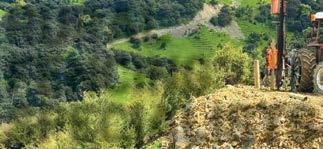





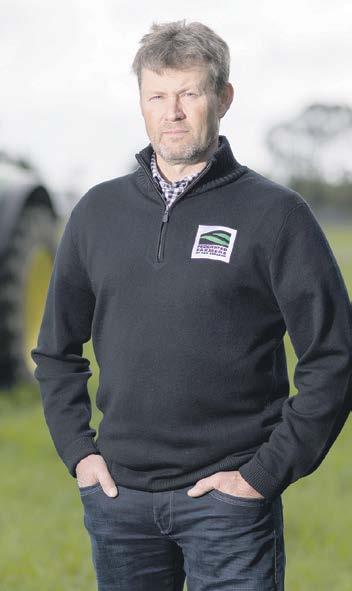







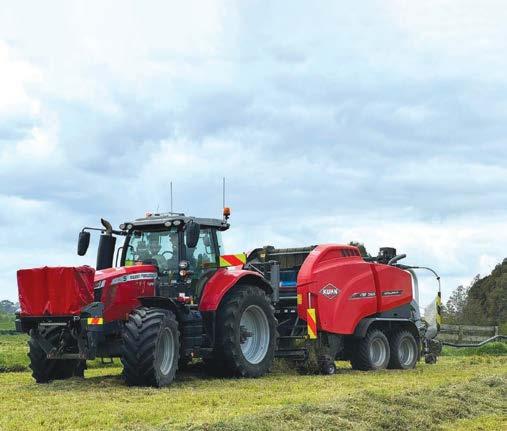
Mark Hooper says mobile coverage is still patchy and unreliable.







Across 1. Grief-stricken (6)
5. Person dependent on something (6)
8. Glutton (colloq) (3) 9. Arch of a road surface (6)
10. Make certain (6)
11. Partiality (4)
13. Spotted beetle (8)
14. Pass on (5)
15. Small, magical figure (5)
Last week
19. Idiot (8)
21. Lifeless (4)
22. Compassionate (6)
23. Very hot and dry (6)
Misrepresent (3)
Cure (6)
(7)
Excite (6)
Meeting plan (6)
Instrument panel (9)
Deadlock (9)
Catch on (7)
Alert, cheerful (6)
Group of six (6)
Pale purple (5)
Polish (3)
Across: 1. Quote, 4. Clammy, 7. Eke, 8. Vendor, 9. Resist, 10. Et cetera, 12. Step, 13. Pompom, 15. Nearly, 16. Once, 17. Gluttony, 19. Bikini, 20. Upshot, 22. Fur, 23. Seemly, 24. Pants. Down: 1. Questionnaire, 2. Odd, 3. Eerie, 4. Certain, 5. Assistant, 6. Miscellaneous, 11. Euphemism, 14. Magnify, 18. Usurp, 21. Sin.
COMFY CARE
FANS FINAL FULL-TIME GOAL GROUND HALF-TIME HEADER HOME LEAGUE LINESMAN MATCH PENALTY PLAYER REFEREE REPLAY RESULT SAVE SCORE SHORTS SOCCER STRIKER STRIP SUBSTITUTE SUPPORTER TACKLE TEAM TOUCH VISITORS WHISTLE
Enjoy welcoming, comfy surroundings and a warm sense of belonging at our Resthaven on Burns Care Centre.
• We are a community charitable trust providing quality, affordable care for seniors.
• Our caring team are here to help you enjoy the things you love, whether it is gardening, baking, trips to town, hobbies, or simply a quiet afternoon relaxing.
• Our commitment to affordability means there is no premium daily room charge at Resthaven on Burns.
on Burns


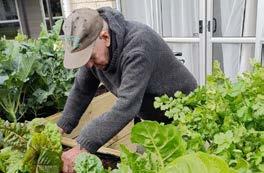
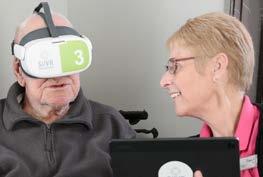
Dismay over forest access
By Jesse Wood
The Waipā District Council says it could be prosecuted by WorkSafe New Zealand if an incident occurs at the Sainsbury Road Forest in Pirongia.
Recreational users of the reserve are up in arms about the situation after a new sign was installed earlier this month announcing walkers and horse riders are prohibited from accessing the site. (see letters, page 2)
Residents have been invited to meet council staff to provide feedback at a drop-in session next Wednesday.
Property services manager David Varcoe said public safety is the main reason for the sign update. The previous sign incorrectly identified the area as a public recreation reserve.
“The terrain is steep, the forest roads have blind corners, and mountain bikers can reach
speeds of 20–30km/h on the tracks. Shared use without proper oversight put people at risk,” he said.
“We understand this change has caused concern, and we are committed to working with the community to find future recreational opportunities that balance access with safety and compliance.
“Council cannot manage these risks effectively if access is open to the general public without oversight, and if there was an incident we could be prosecuted by WorkSafe New Zealand.”
Varcoe said while the council recognises the forest has long been enjoyed by walkers, dog owners and horse riders, unsupervised access to the forest presents significant risks.
The commercial forest is owned and operated by the council who have a responsibility to adhere with the requirements of the Health and Safety at
Work Act 2015.
A cycle trail network is leased to the Pirongia Mountain Bike Club.
Public access to the internal forest roads is not permitted but the unformed section of Sainsbury Rd, extending for about a kilometre past the signage, remains open to pedestrians.
A neighbouring 41-hectare reserve at 205 Sainsbury Rd is available for horse riders to use. The council says it is working closely with an equestrian group to develop new tracks on that site.
“We remain committed to working with the community and is open to ideas for future recreational opportunities in the area, provided they meet health and safety obligations,” Varcoe said.
Dog trainer and behaviour consultant Kelly Wolfe said it’s scary times for Waipā canines.
“I walk my dogs in that forest, relatively regularly, because it’s an appropriate spot for them,” Wolfe said. “I’m really concerned for the future of the dogs in Waipā, especially the higher energy ones that need access to spaces like this.
“I work with a lot of clients who really struggle being in urban environments and not having appropriate spaces to exercise dogs.
“The Sainsbury Forest for me, is a great space to recommend to people to exercise in nature and walk their dog in a relatively quiet space.”
Wolfe enjoys hiking but said there’s not many places her dogs can walk with her anymore.
Lake Ngā Roto, the only other local space, has a narrow boardwalk which is difficult when several dogs are there.

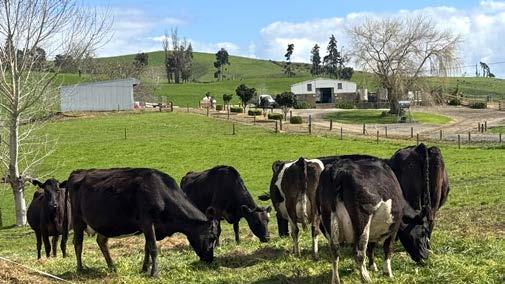

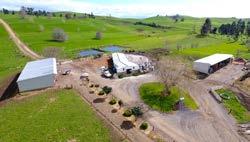











Sainsbury Rd is near Mt Pirongia.
Photo: Jesse Wood

Monarch Southwest








We’re pleased to share that Monarch Real Estate, led by Campbell Scott and Trent Finlay, has purchased the Harcourts Blue Ribbon franchise in Te Awamutu, Ōtorohanga, and Te Kūiti from Ken McGrath and Melanie Barker.
The offices will now operate as Monarch Southwest Real Estate Ltd, expanding the Monarch group’s presence across Waikato and King Country.
Ken and Melanie, who previously worked at Monarch Real Estate (Harcourts Hamilton), have led Blue Ribbon with passion and dedication, helping thousands on their property journeys. We thank them for the strong foundation they’ve built and wish them all the best.
We’re also excited to welcome Diana Manutai as a new part-owner of Monarch Southwest. Diana began her career at Monarch before growing her business with another local brand, and she’s thrilled to join Trent and Campbell in a joint venture within her home community.
Rural & Residential Specialists

















Left to right: Campbell Scott, Diana Manutai, Trent Finlay. Monarch Southwest Real Estate Ltd Owners.









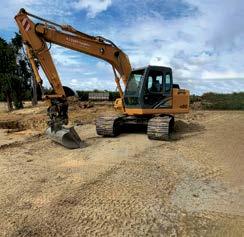






















Got a job to fill?
ADVERTISE YOUR VACANCY WITH US
Call Janine 027 287 0005 or email janine@goodlocal.nz

TE AWAMUTU OPEN HOMES

with Jan Bilton
Lighten up
With warmer weather approaching now is the time to say ‘no’ to deep-fried foods, muffins for morning tea and snacks before dinner. If you want to look your best at the beach, then now is the time to start thinking ‘thinner’s a winner.’
Instead of nibbling on chippies it’s healthier to chomp on a carrot. It certainly curbs the appetite more efficiently and is much lower in kilojoules. A glass of water every so often will also add to that full feeling, as does a hearty helping of fresh vegetables with steamed or poached chicken or fish for a light meal at night. It’s healthier for you to enjoy a larger lunch than fill up just before going to bed.
Consider exchanging some or all of the (fattening) oil for stock or water in stir-fries. The steam generated by the water also helps to cook the vegetables more quickly. Low-fat fish contain lots of goodness but are also ‘low-cal’. Check out the supermarket freezer for some economical options such as squid, mussels and shrimp. These are excellent in salads, stir-fries and many Asian recipes using stock instead of oil.
Eggs are also a good choice for lowerkilojoule meals, as long as they are not fried.
A 50 gram egg has about 250 kilojoules, whereas a 50 gram meat patty (which has to be fried) contains about 500 kilojoules.
Venison & udon noodle stir-fry

Venison is low-fat and nutritious.
400g farmed venison for frying
200g udon noodles
1 tablespoon each: olive oil, finely grated root ginger
1 red capsicum, seeded and thinly sliced
1 clove garlic, crushed freshly ground black pepper to taste
3 tablespoons sweet chilli sauce
2 medium tomatoes, quartered Pat the venison dry. Thinly slice into 1cm strips.
Cook the noodles according to the packet instructions.
Heat a heavy frying pan or wok on high. Add the oil, swirling around the base and sides. Stir-fry the venison in batches until seared but still a little pink. Do not overcook. Remove to one side.
Add the ginger, capsicum, garlic and black
Contact listing agent prior-visiting as
SERVICES FOR TELEVISION REPAIRS & TUNING
pepper, stirring constantly. Pour in the chilli sauce and continue stir-frying for about 30 seconds. Add the tomatoes, venison and drained noodles. Cook for 1 minute to heat through. Serve immediately. Serves 4.
Lemon chicken saltimbocca

2 medium (200g each) skinned and boned
chicken breasts
freshly ground black pepper to taste
12 fresh sage leaves
4 lean rashers streaky bacon
2 teaspoons olive oil
1/3 cup chicken stock
1/4 cup lemon juice
1/2 teaspoon cornflour
Cut each chicken breast in half lengthwise. Season with pepper. Place 3 sage leaves on each piece then wrap in the bacon to secure the leaves in place.
Heat the olive oil in a non-stick frying pan. Pan-fry the chicken on medium for about 5 minutes or until cooked, turning often. Remove and keep warm. Whisk the chicken stock, lemon juice and cornflour and stir into the pan. Cook until thickened. Spoon over the chicken.
Great served with lemon wedges, steamed greens and kumara. Serves 4.
Stir-fried squid with garlic & ginger
300g cleaned, whole squid tubes
2 tablespoons each: water, chopped garlic
1 tablespoon grated root ginger
2 teaspoons canola oil
freshly ground black pepper to taste
1 tablespoon each: oyster sauce, light soy sauce, fish sauce, sugar, lemon juice
2 spring onions, thinly sliced
Cut open the squid tubes lengthwise. Cut in half lengthwise. Place on a chopping board with the inside facing up. Score the flesh in a lattice pattern. Slice the squid into 4cm pieces
Heat the water in a wok and stir-fry the garlic and ginger for 30 seconds.
Add the oil and the squid and stir-fry until the pieces curl and become opaque. Add the black pepper, oyster sauce, soy sauce, fish sauce, sugar and lemon juice. Heat through and add the spring onion. Serve immediately with steamed vegetables and rice. Serves 4.


HUB-BEETEK Beekeeping
– Offering strong pollination hives for orchards, clover, and crops. Certified DECA inspections, full hive health reports, seasonal varroa treatments, mentoring & education for new beekeepers, and professional swarm removal. Serving farmers, growers, and hobbyists across King Country, Waikato, and the Central North Island. Trusted local beekeeper with years of experience. Call John on 022 353 6095. Email: jamps0129@outlook. co.nz to book or enquire.

Pursuant to section 79 of the Trusts Act 2019, all creditors and other persons having claims to which that section applies in connection with the estate of the late Desmond John Strong of Te Awamutu, Farmer, who died on 13 March 2025 must send to the executor, Peter Frederic Strong, at the address specified below before 30 days from the date on which this notice is given, particulars of their claim. They are warned that after that date the estate may be administered or distributed having regard only to the claims of which the executor has notice without being liable to persons of whose claims the executor has not received notice.
Enquiries to: Hayley Boud, Caring Estates Limited Address: Caring Estates Limited, PO Box 9092, Hamilton 3240 or unit 4, 310 Tristram Street, Hamilton Telephone: 021 077 7785.
Email: hayley@caringestates.co.nz
Dairy goat farm 5




Retired John Crichton 027 485 5654


AM and PM shifts
If you are an empathetic person with the “X” factor that all good care givers have and would like to join a committed caregiving team in a supportive work environment.








Call Julia Corby 021 057 3511



Commencement date to be negotiated
An opportunity has arisen for a highly motivated and capable person to join our Learning Support Assistant team.
The successful applicant will have the following attributes:
• Ability to build positive working relationships with a range of students and sta
• Flexibility
• Resilience
• Strong verbal and written skills
• Team player
• Ability to work unsupervised
Core roles will include:
• Student learning and behavioural support
• Student personal care
This is term time only, fixed-term position reviewed annually. Normal hour of work would be 9.00am3.15pm, five days per week (25 hours per week). Email info@tac.school.nz for a Job Description. The successful applicant would be subject to Police Vetting.
Please forward your CV with the names and contacts of two referees to: info@tac.school.nz.
Closing date for applications: Friday 31 October 2025.
TO LET
House for rent
2 bedroom farm cottage
25km west of Pio Pio
Must have references 027 933 5837
For more Information
VEHICLES
WANTED TO BUY. Any ute, van, 4WD, truck or car. Any condition doesn’t have to be going. Cash paid. Ph/txt Kevin 027 299 6165
PLANTS FOR SALE PIRONGIA TOPIARY
GRAZING available for dairy heifers. Ph 027 415 4122 WANTED TO BUY
VEHICLES WANTED – We buy all cars, vans, utes, trucks, in any condition, dead or alive. Call 0800 333 398 or text 021 344 449
Friday 17 October
St John’s Parish Hall Doors open 6.30pm
• Entertainment $25 a ticket available from the office
Open Fridays 10am-4pm 132 Sainsbury Rd Pirongia OR Phone Susan Ranstead 0274 176 379 CHURCH NOTICES
SITUATIONS VACANT
CLEANER REQUIRED - for commercial and domestic with own transport and valid license. Ph 021 732 609
Notice of Annual General Meeting

The Waipa Community Facilities Trust is holding its Annual General Meeting at 6.00pm on the 28th October 2025 in the Stadium Boardroom at the Te Awamutu Events Centre.
Business of meeting:
The annual general meeting shall carry out the following business:
(a) Receive the minutes from the previous annual general meeting; and
(b) Receive the Trust’s statement of accounts for year ending 30/06/2025; and
(c) Receive report from the Chairman of the board and from the CEO; and
(d) Announce retirement of current Trustees and the appointment of new Trustees; and
(e) Appoint an auditor; and
(f) Consider and decide any other matter which may properly be brought before the meeting.
Ruby McPhail - Secretary
PURDON, Paulene Mary
Passed away peacefully at home, surrounded by her loving family, on Saturday, 11 October 2025. Aged 81 years. Dearly loved wife of the late Alistar. Treasured and devoted mum of the McGuire boys – Marc, Paul & Angela, Craig, and the late Wayne. Cherished grandmother of Thomas, Caitlin, Izzy, Nicholas, and Ryan. Adored greatgrandmother of Penelope, Hudson, and one precious little one due in December.
A conversation about Death to help you live more fully 11am next Tuesday 20 August 2024
A conversation about Death to help you live more fully 11am Tuesday 21 October 2025

WAIPA COMMUNITY FACILITIES TRUST
A memorial service to celebrate Paulene’s life will be held at 11:00 am on Friday, 17 October 2025, at Te Awamutu Marist Club, Park Road, Te Awamutu. At Paulene’s request, please wear bright colours — this will be a celebration of her vibrant and loving spirit. Messages to the Purdon Family may be sent c/- 262 Ohaupo Road, Te Awamutu 3800, or left in Paulene’s online tribute book at www. rosetown.co.nz.
KNOX, Jeffrey Reed –Passed away peacefully on 8th October 2025, aged 86 years. Much loved husband of Pamela for 61 years. Adored father and father-inlaw of Jennifer & Chris, Sarah & Hamish. Much loved Poppa to his 6 grandchildren, Anna, Benjamin, Caitlyn, Rebecca, Jackson and Conroy. We would like to thank the San Michele staff for caring for Jeff while there. A memorial service for Jeff will be held at St John's Anglican Church, Arawata Street, Te Awamutu on Friday, 17th October at 11:00 am. The service will be livestreamed for link email office@teawamutufunerals. co.nz. In lieu of flowers, donations to donate.stjohn. org.nz would be appreciated. All communications to the Knox family, PO Box 137, Te Awamutu 3840.
Te Awamutu Funeral Services, FDANZ
Parish of St John’s Lounge 162 Arawata St Te Awamutu
Parish of St John’s Lounge 162 Arawata St Te Awamutu
ALL WELCOME
No cost, but koha welcome
No cost, but koha welcome

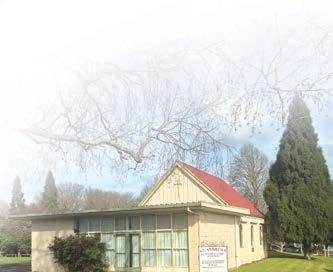
CHURCH SERVICES 10am 19th October Dr Terry Cowland




PUBLIC NOTICE OF PROPOSED PLAN CHANGE
Clause 5 of Schedule 1, Resource Management Act 1991
The following private plan change to the Operative Waipā District Plan has been accepted under delegated authority for public notification by Waipā District Council:
PROPOSED PRIVATE PLAN CHANGE 35: TE AWAMUTU
RETAIL CENTRE
In summary, the proposed private plan change request seeks to change the Operative Waipā District Plan by:
• Rezone 638 Cambridge Road (Lot 1 DPS 10271) from Medium Density Residential Zone to Commercial Zone and associated amendments to planning maps
• Amend Appendix S1 - Te Awamutu Growth Map to remove 638 Cambridge Road from the T11 Residential Growth Cell
• Replace the existing Appendix S6 - Te Awamutu Large Format Retail Site Plan with the revised plan to include 638 Cambridge Road
• Amend performance standards and assessment criteria within Section 6 - Commercial Zone and Section 21- Assessment Criteria and Information Requirements.
The full proposal can be viewed:
• Online at www.waipadc.govt.nz/planchange35
• At Waipā District Council offices in Te Awamutu (101 Bank Street) and Cambridge (23 Wilson Street).
Submissions
Any person can make a submission by sending an electronic or written submission to Waipā District Council by one of the following methods:
• Online: Download Form 5 on the Waipā District Council website at www.waipadc.govt.nz/planchange35
• Send to: Freepost 167662, Waipā District Council, Private Bag 2402, Te Awamutu 3840
• Email: districtplan@waipadc.govt.nz
• Deliver to: Waipā District Council, 101 Bank Street, Te Awamutu OR 23 Wilson Street, Cambridge
The submission must be in the form as set out in Schedule 1 of the Resource Management (Forms, Fees, and Procedure) Regulations 2003 and must state whether you wish to be heard on your submission. Copies of this form are available from Waipā District Council.
Submissions close at 5pm on Friday, 14 November 2025
Steph O’Sullivan - Chief Executive For and on behalf of the Waipā District Council


MATTHEWS, Kirsten
Cheryl (nee Murray)
It’s been one year since our beautiful Kirsten left us, on October 18, 2024. Loved and missed everyday by her husband Grant, and her children Cole, Ethan and Payton. Forever in our hearts.

RUMBLES, Basil Murray – C.M.T.460654.Gunner/ Clerk, 4th MED 5.5 Regt, Aged 91, 1934 to 2025. Loved husband of the late Adrienne nee. Dillon. Brother of Mary and the late Blake. Loved father and father in-law of Murray & Linda, Micheal & AnneMarie, Andrew & Bevan and Kathryn. Proud grandad and great grandad who will be remembered. Requiem Mass will be celebrated at St. Patrick's Church Te Awamutu, 625 Alexandra Street on Friday 17th October at 1pm followed by a private burial. The service will be livestreamed for link email office@ teawamutufunerals.co.nz. All communications please to the Rumbles family, PO Box 137, Te Awamutu 3840.
Te Awamutu Funeral Services, FDANZ
RUMBLES, Basil – My Daddy. The day I never wanted to arrive is here. The day I have to say goodbye. You are my best friend and my favourite human. Moe mai ra. Kathryn. xx


MEREDITH, Len
Sincere thanks for the kind messages, cards, flowers and support received after the passing of my dearly loved husband, Len. You care and kindness have been a great comfort. Special thanks to the staff at Resthaven on Burns for their loving care. With appreciation from the Meredith family.































